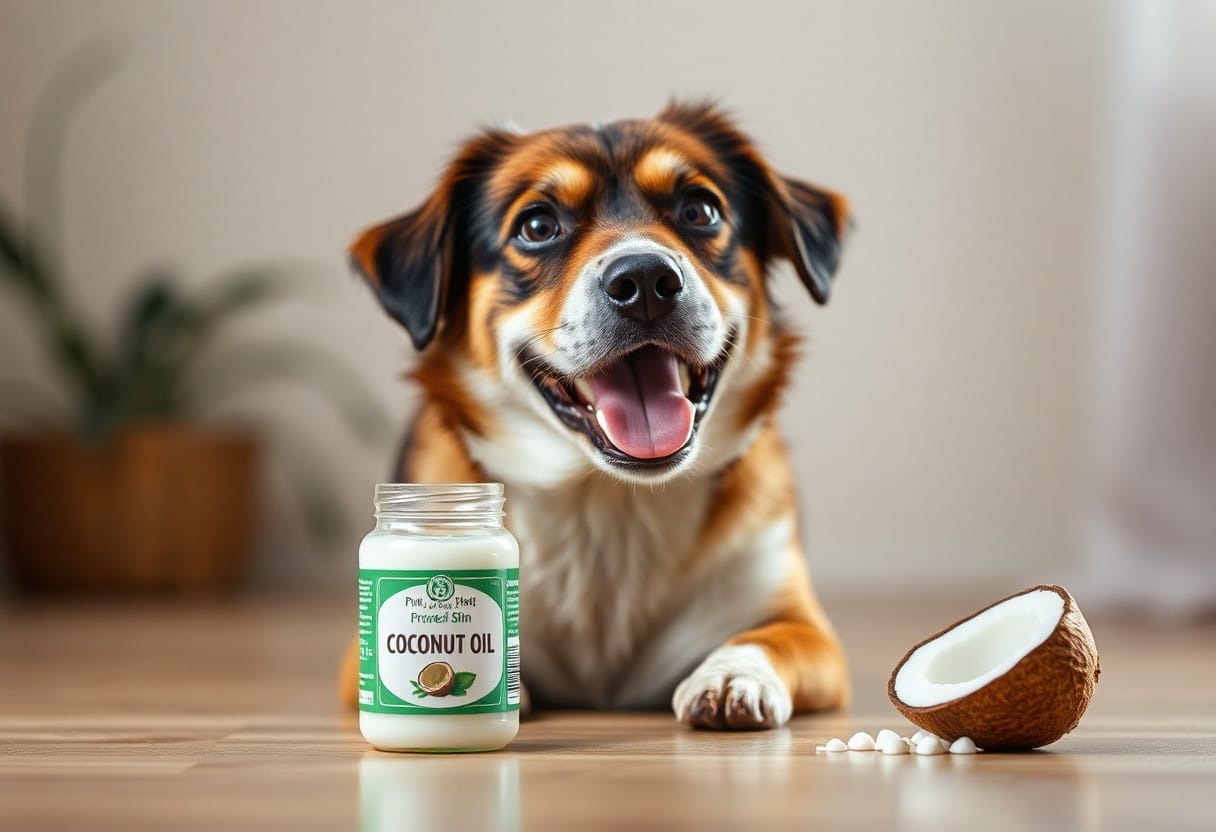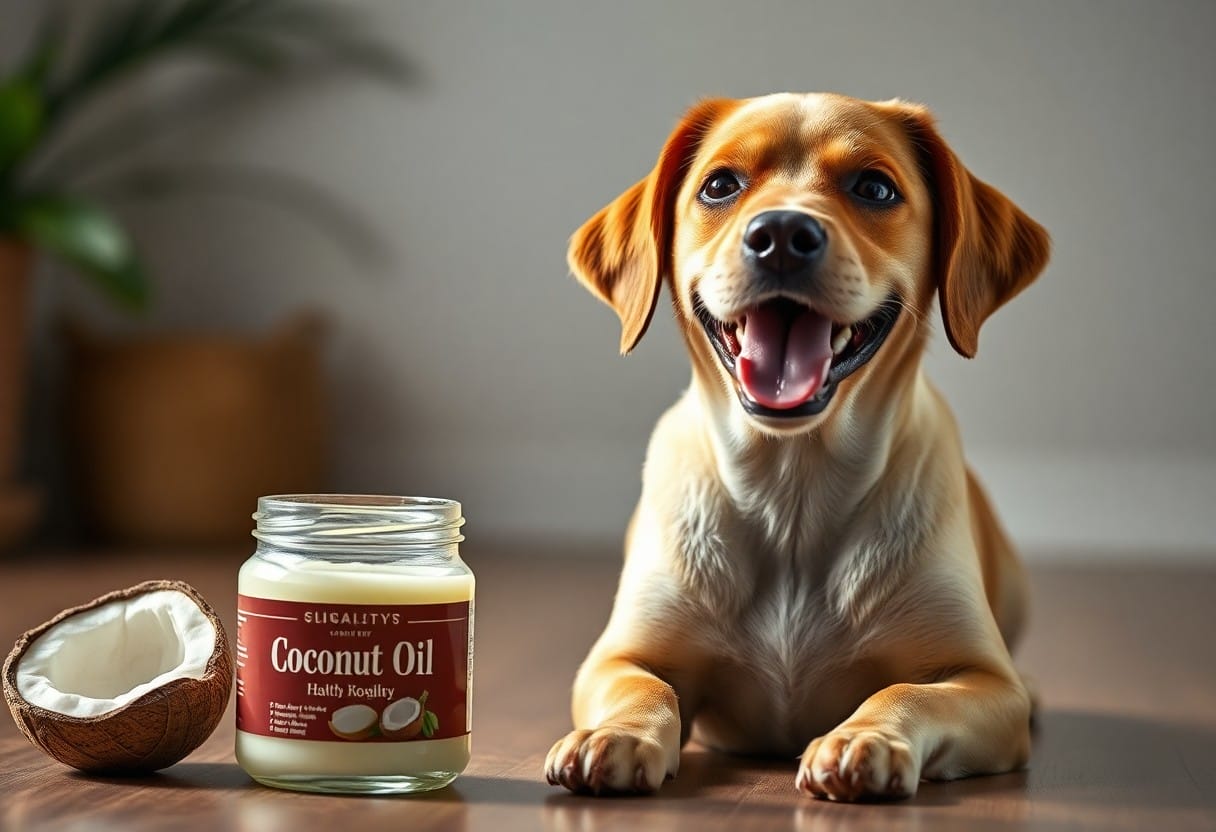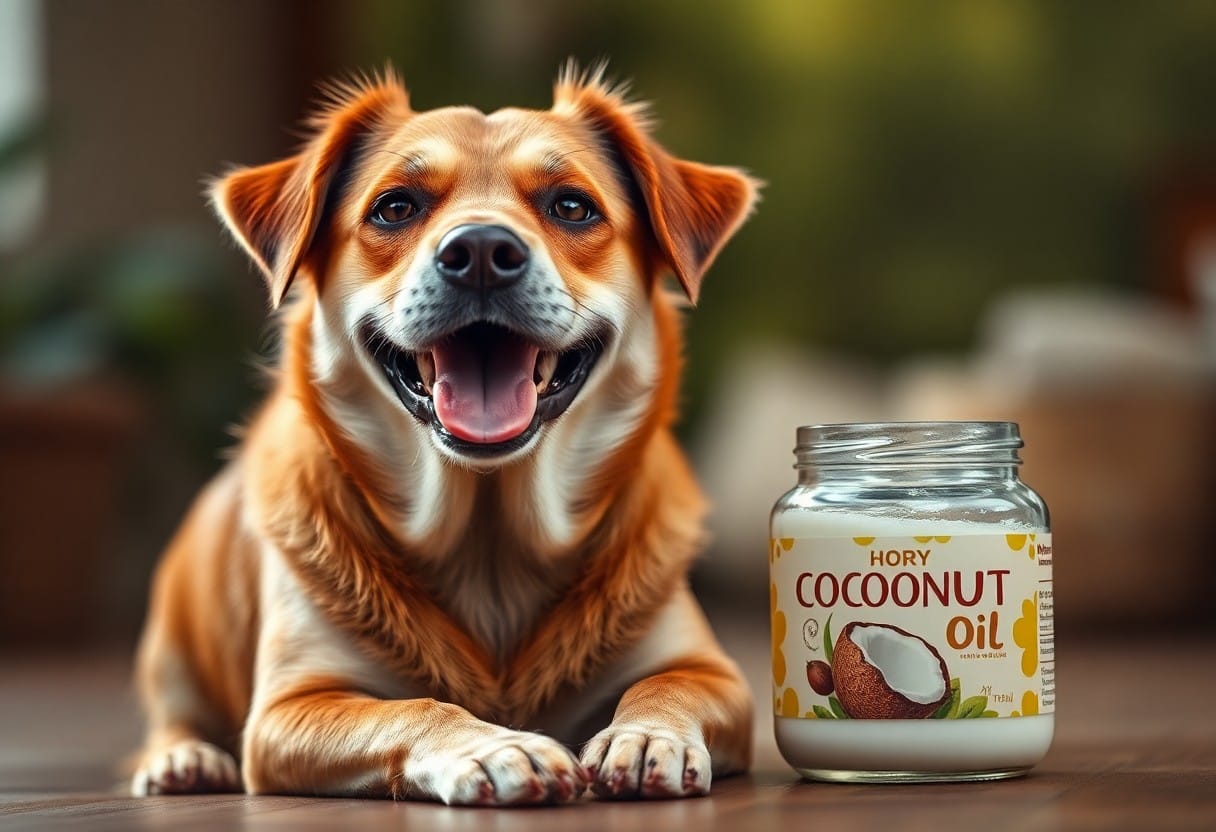
Does coconut oil stop dogs itching?
Share
If you're struggling to soothe severe itching in your dog, you may have considered using coconut oil as a solution. As a dog owner, you want to provide your pet with the best possible care, and understanding the benefits and potential risks of coconut oil is crucial. You'll want to know how it can help alleviate your dog's discomfort and skin irritation, and whether it's a suitable treatment option for your furry friend.

Key Takeaways:
- Coconut oil may help to soothe and calm itchy skin in dogs due to its anti-inflammatory and antimicrobial properties, which can provide temporary relief from itching and scratching.
- Using coconut oil as a topical treatment can help to moisturize and nourish the skin, reducing irritation and inflammation that can cause itching in dogs.
- While coconut oil may not completely stop dogs from itching, it can be a useful addition to a comprehensive treatment plan that includes dietary changes, medication, and other therapies to manage underlying allergies or skin conditions that cause itching in dogs.
Causes of Itching in Dogs
A lot of factors can cause your dog to itch, and understanding these causes is crucial to finding a solution. You need to consider various possibilities, including skin allergies, fleas, and ticks, to provide your dog with the best care.
Skin Allergies
Oddly, skin allergies are a common issue in dogs, and you may notice your dog scratching or licking their skin excessively. You should look out for signs of skin allergies, such as redness or irritation, to determine the best course of action for your dog.
Fleas and Ticks
Approximately, external parasites like fleas and ticks can cause significant discomfort for your dog, leading to excessive scratching and skin irritation. You should check your dog regularly for these parasites to prevent serious health issues.
The presence of fleas and ticks can lead to allergic reactions and transmit diseases like typhus or tapeworms. You can take precautions, such as using preventatives or treating your home, to minimize the risk of infestation and keep your dog safe and healthy.

Benefits of Coconut Oil
Any dog owner knows how frustrating it can be to see your pet suffer from itching. Coconut oil may be the solution you're looking for, offering several benefits for your dog's skin and coat.
Soothing Properties
Around the world, coconut oil is known for its anti-inflammatory and antimicrobial properties, which can help calm your dog's itchy skin and prevent infections.
Natural Remedy
Across various studies, coconut oil has been shown to be a natural and effective remedy for skin issues in dogs, providing a safe alternative to harsh chemicals and medications. You can use it to soothe your dog's skin and reduce itching and irritation.
Soothing your dog's itchy skin with coconut oil can be a game-changer for their comfort and overall health. As you consider using coconut oil as a natural remedy, keep in mind that it's generally considered safe for dogs, but it's always best to consult with your veterinarian before making any changes to your dog's care routine, especially if your dog has a severe allergy or skin condition. You can apply coconut oil topically to your dog's skin or add it to their food, but be sure to use high-quality, pure coconut oil to get the best results.
Applying Coconut Oil to Dogs
Now that you know the benefits of coconut oil for your dog's itching, it's time to learn how to apply it. You can use coconut oil in two ways: topical application and dietary supplements.
Topical Application
Accordingly, applying coconut oil directly to your dog's skin can help soothe itching and inflammation, providing instant relief from discomfort. You can massage a small amount of coconut oil into the affected area, making sure to avoid any open wounds or sensitive areas.
Dietary Supplements
Similarly, dogs can also benefit from consuming coconut oil as a dietary supplement, which can help to reduce inflammation and improve overall skin health from the inside out. You can add a small amount of coconut oil to your dog's food, but be sure to consult with your veterinarian first to determine the best dosage for your dog.
The dosage of coconut oil as a dietary supplement is very important, as giving too much can cause digestive issues in your dog. The benefits of using coconut oil as a dietary supplement include improved skin health and a reduction in itching, but you should always prioritize your dog's safety and consult with a veterinarian before making any changes to their diet. By using coconut oil in a safe and controlled manner, you can help to provide your dog with long-term relief from itching and discomfort. Discover the best health tests for dogs and learn how to monitor your pet’s well-being effectively. Read more here.
Effectiveness of Coconut Oil
Not all remedies are created equal, and when it comes to coconut oil, you'll find that it has some benefits. You can use it to help with your dog's itching, but be cautious of the amount.
Reducing Inflammation
Above all, coconut oil's anti-inflammatory properties can help soothe your dog's itchy skin. You'll notice a significant reduction in redness and swelling when used correctly.
Improving Skin Health
On the other hand, coconut oil can also nourish and moisturize your dog's skin, leaving it healthy and shiny. You can use it to improve the overall health of your dog's skin.
Coconut oil is rich in fatty acids, which can help to lock in moisture and protect your dog's skin from further irritation. As you consider using coconut oil for your dog's itching, keep in mind that excessive use can lead to weight gain and other health issues. You should always consult with your veterinarian before adding any new supplements to your dog's diet.

Precautions and Warnings
Unlike other remedies, coconut oil can be a safe and effective solution for your dog's itching, but you should be aware of the potential risks.
Allergic Reactions
For your dog's safety, you should introduce coconut oil gradually to prevent any adverse reactions, such as skin irritation or digestive issues. This blog explores whether ghee is safe for dogs and its potential health benefits. Read more here.
Overuse and Interactions
An excessive amount of coconut oil can cause stomach upset in your dog, so you should use it in moderation and under the guidance of a veterinarian, as it can interact with other medications.
Also, you should be aware that giving your dog large amounts of coconut oil can lead to pancreatitis, a serious condition that requires immediate veterinary attention, so always follow the recommended dosage and consult with your veterinarian if you have any concerns about using coconut oil for your dog's itching.
Alternative Remedies
Your dog's itching can be alleviated through various alternative remedies that you can try at home.
Oatmeal Baths
Bathing your dog with oatmeal can help soothe their itchy skin, providing fast relief from discomfort and reducing inflammation.
Medications and Shampoos
Above all, you should consider using medications and shampoos specifically designed for your dog's skin condition.
Apart from alternative remedies, when using medications and shampoos, you need to be cautious and follow the instructions carefully to avoid side effects such as allergic reactions. Always consult with your veterinarian before trying any new treatments, as they can help you determine the best course of action for your dog's specific condition and ensure their safety and well-being.
Summing up
As a reminder, you now know the benefits of coconut oil for your dog's itchy skin. You can use it to soothe and calm your dog's irritation, reducing inflammation and discomfort. By incorporating coconut oil into your dog's care routine, you can help alleviate their itching and improve their overall skin health, providing your dog with much-needed relief.
FAQ
Q: Can coconut oil help stop dogs from itching and scratching?
A: Yes, coconut oil can help alleviate itching and scratching in dogs. The oil contains anti-inflammatory and anti-fungal properties that can soothe skin irritations and reduce discomfort. Additionally, coconut oil's moisturizing properties can help to hydrate dry skin, reducing the urge to scratch and itch.
Q: How does coconut oil work to stop itching in dogs?
A: Coconut oil's anti-inflammatory properties help to reduce redness and swelling, while its antimicrobial properties prevent the growth of bacteria and fungi that can cause skin infections. The oil's fatty acids, particularly lauric acid, also have anti-inflammatory effects that can help to calm irritated skin and reduce itching.
Q: How do I apply coconut oil to my dog's itchy skin?
A: To apply coconut oil to your dog's itchy skin, start by warming the oil in your hands or by placing the bottle in a bowl of warm water. Then, gently massage the oil into the affected area, making sure to cover the entire area evenly. You can also add a few drops of coconut oil to your dog's food or use it as a leave-in conditioner after bathing. However, always consult with your veterinarian before using coconut oil on your dog, especially if they have sensitive skin or allergies.
Q: Are there any potential side effects of using coconut oil on my dog's skin?
A: While coconut oil is generally considered safe for dogs, there are some potential side effects to be aware of. Some dogs may experience skin irritation, such as redness or hives, if they are allergic to coconut oil. Additionally, if your dog ingests large amounts of coconut oil, it can cause gastrointestinal upset, including diarrhea and vomiting. It's crucial to use coconut oil in moderation and under the guidance of a veterinarian.
Q: Can I use coconut oil as a replacement for my dog's regular medication or treatment for itching and scratching?
A: No, coconut oil should not be used as a replacement for your dog's regular medication or treatment for itching and scratching. While coconut oil can be a useful complementary therapy, it is crucial to consult with your veterinarian to determine the underlying cause of your dog's itching and scratching. Your veterinarian can help you develop a comprehensive treatment plan that may include coconut oil as part of a broader approach to managing your dog's skin health.
